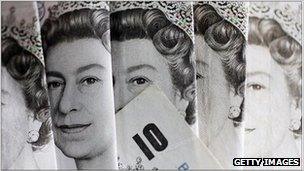John Swinney issues warning over tax relief cap plans
- Published

Charities and universities have already raised concerns over the tax relief plans
The voluntary sector will be damaged by Chancellor George Osborne's plan to cap tax relief for charitable donations, Scottish Finance Secretary John Swinney has claimed.
In a letter to the chancellor, Mr Swinney warned the move could affect donations from philanthropists.
From 2013, tax relief on donations is to be capped at £50,000 or 25% of a person's income, whichever is higher.
The UK government has argued the cap is necessary to tackle tax avoidance.
Mr Osborne, who announced the move in his Budget last month, said recently he was shocked by the scale of legal tax avoidance by multi-millionaires.
But Mr Swinney said he feared the cap would result in a substantial reduction in the amount of tax philanthropists could claim back.
He told the BBC's Sunday Politics Scotland programme: "This can create a perception that charitable giving is not welcome and that would be disastrous because there are hundreds and thousands of people right across our country that give to charities.
"I don't think we should put any obstacles or barriers in their way or create an atmosphere that suggests charitable giving is not in some way welcome or desirable."
In his letter to the chancellor, Mr Swinney wrote: "Whilst I fully support the need to ensure wealthy individuals do not avoid their tax obligations, I believe that, as they currently stand, your proposals will damage the third sector in Scotland (and indeed elsewhere) by reducing the number and level of charitable and philanthropic donations.
"The current financial climate is already proving very difficult for Scottish charities and third sector organisations without a further reduction in what is an important source of funding."
The finance secretary's concerns echo those raised by universities, including Oxford and Cambridge, and a range of charities across the UK, who have called for Mr Osborne to rethink his plans.
Senior Liberal Democrat Sir Menzies Campbell told Sky News he had written to George Osborne about the impact on charities in his capacity as chancellor of the University of St Andrews.
'Avoiding tax'
He said: "The proposals the chancellor has made could easily hit the kind of targets we need to seek out ourselves in order to persuade people, such as former graduates, to make generous donations.
"The government is obviously accepting it has got to go back and look at this again."
The Scottish Council for Voluntary Organisations has estimated that voluntary grants and donations make up 10.7% of Scotland's voluntary sector income, equivalent to £470m in 2010.
Its convener, Alison Elliot, told BBC Scotland: "We can talk about how much money might or might not be lost through this scheme, but what we do know is the message that's being given out is the idea that giving to charity is avoiding tax.
"I know, from trying to persuade people, that it is often quite difficult to persuade them that gift aid is an ok thing to do. They already see that as cheating the taxman.
"If the government is coming out and saying that giving to charity is part of avoiding paying taxes then it is going to have a knock on effect on people who are giving modest donations regularly to modest charities."
- Published10 April 2012
- Published10 April 2012
- Published26 April 2013
- Published28 March 2012
- Published21 March 2012
- Published16 March 2012
- Published5 April 2012
- Published21 March 2012